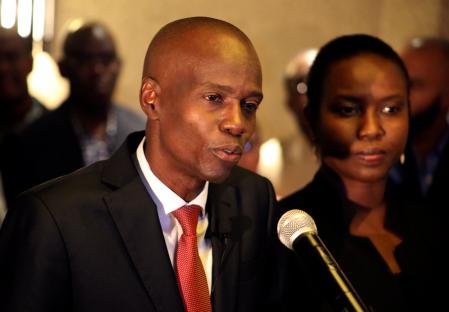
By Joseph Guyler Delva and Makini Brice
PORT-AU-PRINCE (Reuters) – The winner of Haiti’s presidential election, Jovenel Moise, vowed on Thursday to reform the constitution and tackle corruption when he takes office next year.
The electoral council said Moise won a majority of votes and prevailed by more than 25 percentage points, according to preliminary results for the Nov. 20 vote that Haitians hoped would put the country on sounder political and economic footing.
Turnout for the election was only about 20 percent in the poorest country in the Western Hemisphere. If the results are not successfully challenged, there will be no second round and Moise will become the Caribbean country’s next president.
Final results are due to be announced on Dec. 29.
Moise will take over from a transitional government in power since his predecessor and political benefactor, Michel Martelly, left office in February, and his victory sparked protests by political opponents that the election was rigged.
He will have no shortage of challenges, facing galloping inflation and high unemployment.
In an interview, Moise said he won rightfully and would use the mandate to implement constitutional and institutional reforms intended to boost stability and reduce corruption.
“The constitution represents a blockage,” said Moise. “We are in a phase of democratization. We are constructing a democracy. We cannot construct a democracy with irritants.”
He argued that Haiti should not stage multiple local, parliamentary and presidential elections during a five-year presidential term and suggested holding them at the same time.
Anti-corruption judges would need to be vetted better, while institutions already in place to combat the “plague” of corruption would have to be reinforced and reorganized, he said.
“Corruption is the main brake (to development) in poor countries,” said Moise. “At the highest level of the government, we have to set the tone and preach by example.”
Moise also said he would include people of other political stripes in his administration, noting that political instability had led to a dependence on international aid.
“You cannot develop a country on donations,” he said.
Moise also pledged to overhaul the economy, making particular mention of agriculture, tourism and construction.
“I can’t say in five years I will make Haiti 100 percent self-sufficient (in food),” said Moise, an agricultural entrepreneur known on the campaign trail as the “Banana Man.”
“I think that if Haiti is not self-sufficient in food, it is because we have stopped working,” he added.
(Reporting by Joseph Guyler Delva and Makini Brice; Editing by Peter Cooney)











